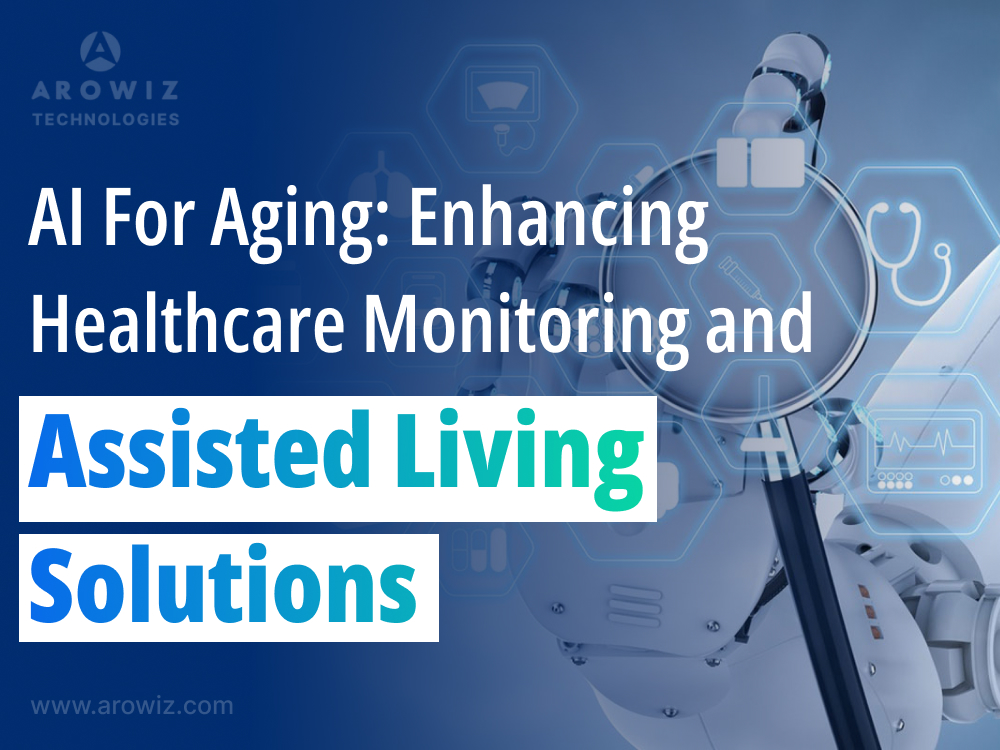Leveraging AI to Enhance Healthcare and Independence for Seniors As people around the world get older, finding new ways to…
AI for Aging: Enhancing Healthcare Monitoring and Assisted Living Solutions
admin
- June 27, 2024
4 min read

Leveraging AI to Enhance Healthcare and Independence for Seniors
As people around the world get older, finding new ways to help them stay healthy is very important. Artificial Intelligence (AI) is leading this change with new technologies that make healthcare better and offer advanced living support. AI helps improve medical care and makes it easier for older adults to live on their own, making life better for seniors.
AI in Healthcare Monitoring
One of the best uses of AI for aging is in healthcare monitoring. AI-powered devices and systems can keep track of vital signs all the time, spot problems early, and alert caregivers or doctors right away. This constant monitoring helps find health issues early, leading to quick action and better control of long-term conditions.
Supercharge your startup with our FREE MVP Guide E-Book
Download it now to kickstart your growth and turn your ideas into reality.
Wearable Health Devices

Wearable devices with AI technology, like smartwatches and fitness trackers, can monitor health metrics such as heart rate, blood pressure, oxygen levels, and physical activity. These devices offer real-time data and alerts, helping seniors manage their health proactively and allowing healthcare providers to monitor their patients’ health remotely.
Predictive Analytics
AI systems use predictive analytics to identify potential health risks before they become serious problems. By analyzing past health data and recognizing patterns, AI can predict the chances of events like falls, strokes, or heart attacks. This enables preventive measures, significantly reducing the risk of severe health issues.
Assisted Living Solutions
AI is also revolutionizing assisted living, allowing seniors to maintain their independence while getting the support they need. Smart home technologies and AI-powered assistive devices enhance safety, convenience, and quality of life for the elderly.
Smart Home Technology
AI-equipped smart home systems can automate various household tasks and create a safe living environment for seniors. These systems can control lighting, heating, and appliances, and include voice-activated assistants to help with daily activities. Additionally, smart sensors can detect unusual behavior patterns, like inactivity or wandering, and alert caregivers or emergency services if needed.
Robotic Assistants
AI-driven robotic assistants are now more prevalent in assisted living facilities and private residences. These robots handle various tasks, such as reminding seniors to take medication, aiding with mobility, and offering companionship. By decreasing the necessity for continuous human oversight, robotic assistants empower seniors to maintain greater independence.
Enhancing Social Interaction

Isolation and loneliness are big problems for many older people. AI technologies are tackling these issues by helping with social interaction and providing mental stimulation.
Virtual Companions
AI-powered virtual companions engage seniors with conversations, games, and cognitive exercises, offering companionship, entertainment, and mental stimulation. They help combat loneliness by providing interactive support tailored to seniors’ needs, enhancing their emotional well-being and quality of life.
AI platforms are revolutionizing how seniors stay connected with family and friends through video calls, social media, and messaging apps. By simplifying communication and sharing experiences, AI strengthens social bonds and support networks among the elderly.
Case Study: AI in Senior Health
An exemplary instance of AI’s impact on aging can be seen in senior living communities utilizing AI-driven health monitoring systems. These communities integrate AI-powered sensors and wearable devices into residents’ daily lives. These devices continuously monitor vital signs, activity levels, and sleep patterns. When anomalies like elevated heart rates or falls occur, the system alerts on-site medical teams immediately.
For example, an elderly resident experienced a sudden drop in blood pressure at night. The AI system swiftly detected this and alerted medical staff who intervened promptly, preventing a potential health crisis and showcasing AI’s vital role in senior health care.
Advantages and Challenges of AI in Aging
Advantages:
- Enhanced Health Monitoring: Real-time monitoring allows for early detection and intervention.
- Increased Independence: AI-powered assistive technologies promote independent living while ensuring safety.
- Improved Quality of Life: AI solutions provide mental stimulation, social interaction, and aid with daily activities, enhancing overall well-being.
Challenges:
- Privacy Concerns: Collection and analysis of personal health data raise privacy and security issues.
- Accessibility: Ensuring affordability and accessibility of AI technologies for all seniors is crucial.
- Dependence on Technology: Over-reliance on AI may reduce human interaction and emotional support.
Supercharge your startup with our FREE MVP Guide E-Book
Download it now to kickstart your growth and turn your ideas into reality.
Conclusion
In conclusion, AI technologies offer vast potential to support healthy aging by enhancing healthcare monitoring and providing innovative assisted living solutions. By improving medical care, fostering independence, and promoting social interaction, AI contributes to seniors leading healthier, more fulfilling lives. Addressing challenges such as privacy, accessibility, and over-dependence on technology is essential to ensure equitable benefits from AI advancements. As AI continues to evolve, its role in transforming the aging experience promises a brighter, healthier future for older adults.
Tags
- aiHealthcareSolutions
Our New Letter
Get productivity tips delivered straight to your inbox
Ready for more?

Arowiz Technologies is a Central India-based customer Centric software development & Expert IT Staff Augmentation company ...
FOR JOBS
hr@arowiz.comFOR SALES
sales@arowiz.comMARKETING / BLOGS
info@arowiz.comGET CONNECTED
Top Industry
About Us
Top Services
Hire Expert Developers
- AI / ML Developers
- Blockchain Developers
- DevOps Developers
- Web3 / Gaming Developers
- Full Stack Developers
- AR / VR – Meta Developers
- Python Developers
- Solidity Developers
- Node.js Developers
- ReatJs Developers
- Next.Js Developers
- Flutter Developers
- React Native Developers
- Golang Developers
- Mobile App Developers








